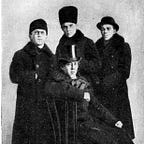Logos vs Pathos: A Story about Eros
Lately I’ve been writing about how ethics is synonymous with pragmatism. Every action is ethical. Ethics is always practice. Which is why it seems that we’re the political animal. Ethics in practice is political when there’s more than two people practicing. Once we’ve signed a treaty, the political and ethical subsume. We end up relating ethics with politics rather than practice. This makes ethics dirty.
Beyond ethos, we have logos and pathos.
Plato envisioned the soul as being led by two horses. One reason, or logos. The other emotion, or pathos. Intellect controlled the two and acted as the authoritative figure in the calculation.
Fast forward 2,000 some years and we have psychoanalysis. Psychoanalysis tries to re-envision the human intellect as coming after the two horses. For example, wherever we find ourselves the only way of knowing where we’re going is by looking back. Plato’s chariot may have tried to look forward and react to what it saw accordingly. Psychoanalysis said, your reaction is predetermined if the source of your movement is dogmatic knee-jerk calcification.
That is, our psyche is born in the world as a bundle of nerves and this bundle of nerves comes to relate to itself based on the logical relationship it’s able to entertain in its head. Eventually this psyche turns into a calcified “self.” An intelligible self insofar as the self acts as a logical figure that can go in and out of “understanding.”
Logical relationships in the previous paragraph is meant to relate to our understanding insofar as we can understand. This can be extended to math. Where the self becomes a “mathematician” in that the self acts as a mathematician by realizing mathematical relationships.
What psychoanalysis tried to do was use mathematical relationships to describe everyday events. And use “pathos” or “emotions” as discrete values within the everyday-mathematical formulas. The more and more psycho-math problems you solve in therapy, the more and more you see a “self” emerge within the chaos that you did not see before. Presumably because the trained therapist will guide/aid you in how to move around the problems.
But if you can move within pathos (or your emotions) by using logos (or reason) are you something beyond pathos and logos? Not necessarily.
Logos can be thought of as universal. It’s what connects us and what will be here after we’re gone. What’s present in this eternal logos we share is our individual temporal pathos. The discrete values that can reveal ourselves if reflected on. How can pathos reflect on itself?
Pathos notices the logos are shared by all. The logos as seen from afar is how they follow from behind. When we look behind us to see our pathos we see our neighbor. The pathos, however, is uniquely “ours.”
Looking further in, we realize that the pathos is not “ours.” But rather, our pathos is distinguished by its place in the universe insofar as the pathos was able to find itself hitching a ride on a spiraling logos.
We can interact with the logos. We are logos. But we are only logos insofar as are a manifestation of pathos.
Analytic philosophy is famous for being cold-hearted, pathological, robotic, unethical. Precisely because it focuses on a logos without pathos. In envision the philosopher as purely words or language.
Philosophy can’t be done in a vacuum. Thus the analytical philosopher gives a Wittgensteinian silence to all the pathos to create a pseudo-vacuum where it can practice its blasphemy. The Europeans aren’t much better, tho. We’re fucked either way.
